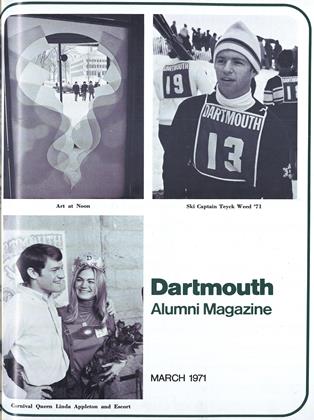Selected and with a preface and an essay on"War Poetry" by Richard Eberhart '26.Hanover: Dartmouth Publications, 1970.Limited edition, 200 copies, printed atThe Stinehour Press. 87 pp. $2.
This anthology of poems by Richard Eberhart's students at Dartmouth is the latest in a series that began in 1958. The seventy poems, largest number yet published in one volume of the series, represent the work of 35 student writers over the last academic year. Few of them directly reflect the spirit of activism and reform which erupted during last year's spring quarter. Rather, I would say that most are somber and ironic in mood, often bitter and despairing. The war in Indo-China occasions some of these poems, but, collectively at least, the despondency broadens to a general Weltschmerz.
For example, John Van Arsdell's "Class Poem 1970," first printed in The Dartmouth at Commencement, expresses mainly a weary pessimism reinforced with echoes from Eliot's The Waste Land, although at the end it does, without conviction, exhort the class to "Do." Stanley Jacoby, whose three poems are as cynical as any, predicts in "Afterword" that he who today defies the conformity and materialism of a consumer society is destined eventually to be "caught. / Sterilized. / Freeze-dried. / And vacuum- packed" by it. Two other poets show dark visions of a society reverted to ignorance and savagery. Poems on more personal topics continue the melancholy strain, concentrating on themes of fear, isolation, and loneliness.
Most of these pessimistic poems have true insights and are skillfully made. They are not lugubrious or dull. But, as a group, I find their negativism one-sided; they do not communicate the sense of lost, wasted, or unattained good which adds poignancy to dejection or despair.
Thus most of the love poems, although they also tend to wistful themes of imperfectly fulfilled love, falling out of love, or past love, are more balanced; for love, an affirmative experience, explains the melancholy. Two women undergraduates, Susan Donovan and Judith Dern, contribute some of the most sensitive and subtle love poetry in the volume.
I have space to mention only a few of the poems that I think exceptional. Timothy Russell's six poems ably treat a variety of moods and themes; one, "Seduction," shows a rare sense of humor. Byron Bang's "Holiday Dock" celebrates the freedom and sensuous delight of summer at the shore. Brad Johnson's "Queechee Gorge's Spinning Bridge" is a subtle and intriguing contemplation of mystery surrounding life. In three poems, John Van Arsdell with exquisite imagery evokes some childhood experiences and makes them rich with symbolic possibilities.
A member of the Department of English atThe University of Vermont, Professor Dickerson, son of Dartmouth's Dean of Freshmen,specializes in Chaucer and the poetryof the Middle Ages.
 View Full Issue
View Full Issue
More From This Issue
-
 Feature
FeatureTHE FINANCIAL CRUNCH
March 1971 -
 Feature
FeatureART AT NOON
March 1971 By PETER D. SMITH, -
 Feature
FeatureCONFERENCE CENTER
March 1971 -
 Article
ArticleThe Undergraduate Chair
March 1971 By LAWRENCE G. MANLEY '71 -
 Books
BooksBriefly Noted
March 1971 By JOHN HURD '21 -
 Class Notes
Class Notes1950
March 1971 By JACQUES HARLOW, ERIC T. MILLER
A. INSKIP DICKERSON JR. '56
Books
-
 Books
BooksAlumni Articles
JULY 1970 -
 Books
BooksRAYMOND OF THE TIMES
October 1951 By Arthur M. Wilson -
 Books
BooksTHE DARTMOUTH SCENE
January 1950 By Charles A. Proctor '00 -
 Books
BooksFACULTY PUBLICATIONS
February, 1923 By JAMES G. STEVENS. -
 Books
BooksA GIRL WHO WOULD BE QUEEN
December 1939 By MILDRED SAUNDERS -
 Books
BooksAMERICANS AND CHINESE COMMUNISTS, 1927-1945: A PERSUADING ENCOUNTER.
NOVEMBER 1971 By WILLARD PETERSON


